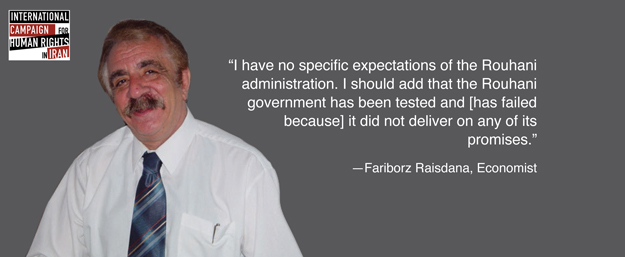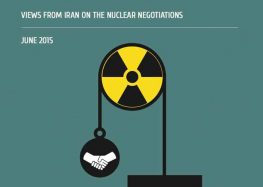Focus on economic recovery

In general, all interviewees agreed that the sanctions have caused tremendous erosion of the economic well-being of the population and that economic revitalization must be a top priority for Rouhani’s government if a nuclear deal is reached.
Download the report here.
The most tangible and immediate result [following an agreement] the people would feel would be the economic issue. Problems caused by the sanctions are palpable in every home right now.
–Ahmad Shirzad, University Professor and Former Member of Parliament
The lifting of sanctions will probably be a long process, but fixing and organizing the country’s economy is the most important thing the government must do.
–Lawyer in Tehran
Economic priorities [include] employment, strengthening the rial, encouraging foreign investors with incentives, promotion of supportive policies for the private sector, and… welfare priorities [must include] policies to support youth, mothers, and women heads of households.
–A Journalist in Tehran and Former Political Prisoner
Seventy-one percent of respondents expect a deal to result in tangible economic gains, with remarks typically noting the benefits of an end to sanctions and an increase in oil revenue and investment, and the resulting gains to manufacturing, growth, and employment.
It’s unlikely that the sanctions are lifted quickly, but the process for smoothing international relations would create these opportunities for the government, as well as the private sector.
–A Civil Rights Lawyer in Tehran
If the nuclear issue is eventually resolved, political and economic relations with the West will improve and…the people’s conditions will improve, because a group of manufacturing units have reduced their production as a result of a weakened rial and their reliance on imported material and…have completely disappeared. Once these manufacturing units become active, they will employ a work force and the growth rate will increase….If relations with the West improve, oil sanctions will be lifted and our blocked funds will be released, and the economy would improve.
–Mehdi Taghavi, Economist
Some of the interviewees pointed out that a meaningful economic recovery can be achieved only if proper planning would ensure that economic problems such as unemployment and inflation are effectively tackled. Citing the existing dysfunctional economic infrastructure and decades of economic mismanagement, these interviewees were skeptical such planning would take place.
If the administration does not have a plan for after the nuclear agreement, we will face widespread public disappointment…the results of this are so destructive, they could cause a complete collapse of the economic system.
–Mohammad Aghazadeh, Journalist
I have no hope that this agreement is able to make a…difference in the Iranian economy. This is because the [benefits would not] flow into veins that could make the economy more nimble. [Instead], they would head towards activities that were not effective in [meeting] economic needs such as employment, [reducing] inflation, [or increasing] productivity.
–Fariborz Raisdana, Economist and Former Political Prisoner
Several interviewees expressed specific concern that domestic manufacturing, hard hit after years of sanctions, could be seriously jeopardized by the impact of large-scale imports following a deal.
There is a high rate of closures [of manufacturing workshops] and these units’ owners have refused to continue production due to lack of capital. It is predicted that once the sanctions are lifted, more goods will be imported and manufacturing may not improve as a result.
–A Journalist in Tehran and Former Political Prisoner
If a [more] positive international environment is not tied to productive economic growth, we can expect to see the remaining domestic production destroyed in favor of imports.
–Mohammad Aghazadeh, Journalist
Another frequently cited concern was that widespread and entrenched corruption would prove to be a serious block to broad economic gains. Many of the interviewees, echoing comments that have been extremely prevalent in the Iranian press and in social media networks in Iran, commented on endemic corruption in Iran among state institutions such as the Islamic Revolutionary Guard Corps (IRGC) and other state and quasi-state organizations, and argued that any economic benefits in a post-deal environment, especially an increase in oil revenue, would likely be lost to corruption and captured exclusively by those who have access to power.
Because the economic structure is the same as it was, if resources are released, they will be utilized by economic groups and individuals who are powerful and [this] has nothing to do with development and productive growth.
–Fariborz Raisdana, Economist and Former Political Prisoner
The top priority should be to combat the looting centers, centers that impede a productive economy. In order to eliminate these centers, press freedom and an open political atmosphere are the main prerequisites. There is no other way.
–Mohammad Aghazadeh, Journalist
[Only] their [the State’s] financial and economic situation would change [after an accord]. They live with oil money. The IRGC [Iran’s Revolutionary Guards] and the Basij [the Guards’ volunteer militia] operate with oil money.
–Jamal Mirsadeghi, Author
Related to the concern that economic benefits in a post-deal environment would be disproportionately captured by the wealthy and connected was a fear that income inequalities, which have increased tremendously in Iran during the past decade, would worsen after any lifting of the sanctions.
Prior to Mr. Rouhani’s election, we had four years of negative growth rate, where there was unfair distribution of wealth. The poor grew poorer and the rich grew richer.
–Mehdi Taghavi, Economist
There will be some openings in economic and cultural areas, but such openings may not have a profound impact on the middle layers.…The banks will be able to do their jobs, medicine sanctions will be lifted. This would be good, as many of our patients have problems obtaining their medication and medications are expensive. Even in the aviation industry things will be good, because many of our passenger airplanes have…no repair facilities… and we can’t [get] spare parts. But the economic [benefits] would impact the higher income levels and we cannot expect that there would be some fantastic opening for the middle and lower levels.
–Abbas Ghaffari, Film Director
Awareness of the dangers of unrealistic expectations regarding the economic gains following an accord was also frequently noted by the interviewees. They cautioned that any benefits would be gradual, and that heady expectations risked disappointment.
If we reach an agreement, there will be a short-term psychological effect, and of course, not proportionate to the people’s expectations.
–Mohammad Aghazadeh, Journalist
Many officials have also stated that we must not expect that there would be a major drop in the value of the US dollar in Iran. This indicates that we cannot even be hopeful for an economic improvement over the immediate future.
–Abbas Ghaffari, Film Director

